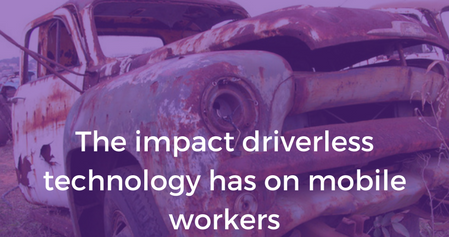
The main public debate about the future of driverless vehicles seems to be…exactly when it’s all going to happen. Will it be in 2030 or 2070 that human drivers finally become obsolete on our roads?
And these predictions are reasonable. They’re based on the rapid advances being made by the likes of Google and Volvo with their self-driving car projects. Google’s fleet of driverless vehicles have now racked up more than 1.7 million miles of, relatively safe, road time.
So if you’re managing a company that provides mobile goods or services, it seems that the future’s already mapped out. It’s only a matter of time before mobile workers are phased out and replaced by fleets of shiny automated vehicles.
But there’s a long history of these kind of tech predictions that prove to be way off the mark. Remember how everyone was going to have 3DTV? And when was the last time you saw somebody commute to work on a Segway or wear a pair of Google glasses?
So there are plenty of good reasons to view the current hype about automated vehicles with a slightly more critical eye. Here’s a look at some of the reasons why humans are going to be very hard to beat when it comes to mobile working:
It solves a trivial problem
If you made a list of all the difficulties involved with delivering goods and services - somewhere near the bottom, would be the actual act of driving. Because the ability to get from A to B is something that most adults can handle effortlessly - particularly with the aid of a sat nav.
Most of the challenges with mobile working only start when employees get to their destination. It’s finding parking, hunting down addresses, delivering the services and interacting with customers/clients.
Automation can’t match human judgement
Mobile workers make thousands of judgements each day and many of these involve navigating grey areas of company policy. Occasionally, the importance of hitting making it to a job may outweigh the risk of receiving a parking fine.
It’s the kind of judgement that cannot be automated. Legally, it’s difficult to see how manufacturers would ever get the go-ahead to create an automated technology that allows any kind of laws or regulations to be breached.
The technical challenges of city driving
The statistics used to show the progress of automated vehicles tend to focus on how far they’ve driven. But most of these miles are racked up on motorways where the driving conditions are least problematic.
A huge barrier facing this technology is the need to cope with the infinite number of interactions that can occur in a city area. It’s the chaotic mix of pedestrians, potholes, roadworks and general randomness that computer AI will need to handle.
The wrong kind of weather
A lot of the publicity surrounding automated vehicles makes it appear as if there are only fairly minor technical barriers left to overcome. But there are some issues remaining that are a long way off from being solved, such as the weather.
The LiDAR sensors and cameras that driverless vehicles rely on struggle to handle any kind of adverse weather conditions such as rain, fog, mist and snow. So while the technology may work flawlessly on Florida highways, it’s nowhere near being able to handle the murk of a soggy M62.
The cost savings are negligible
One of the benefits often cited about automated vehicles is the cost savings this technology can deliver. But for a companies providing mobile goods or services, it’s hard to see exactly where these savings would actually come from.
With the possible exception of haulage, vehicles will still need to carry a mobile worker who will still need to be paid. The vehicles still need fuel, servicing, tax, insurance and all the rest of the normal costs. The predicted savings are based on a reduced number of accidents - something which is yet to be proven.
If you're worried about the impact driverless technology has on mobile workers, you should definitely be worried about the effect of paper based management.
Image credit: Freeimages.com / Richardo Gurgel


